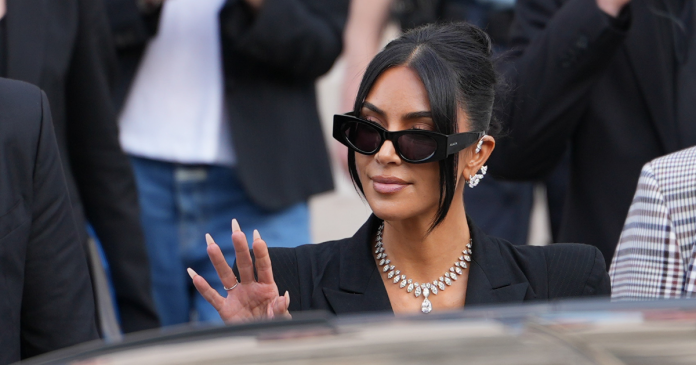Nearly a decade after reality star Kim Kardashian was bound, gagged, and robbed at gunpoint during Paris Fashion Week, a French court has delivered its long-awaited verdict. In a dramatic conclusion to one of the most high-profile celebrity crime cases of the 21st century, eight defendants have been found guilty of participating in the 2016 heist. The gang, nicknamed the “grandpa robbers” due to the advanced ages of many members, stole more than $10 million worth of jewelry from Kardashian’s hotel suite. Despite being convicted of robbery, kidnapping, and related offenses, none of the convicted individuals will return to prison.
The trial, which began in late April 2025, drew widespread international attention. This wasn’t merely because of Kardashian’s celebrity status, but also due to the boldness of the crime, which occurred in the heart of Paris, and the symbolic resonance it carried in discussions around fame, personal security, and the role of social media in modern life. Kardashian herself traveled to Paris to give testimony, describing in painful detail the traumatic night she believed she would be killed. Her appearance and words illustrated the profound psychological toll the robbery has taken on her, and on the broader issue of how public figures are increasingly vulnerable in the digital age.
According to court documents and extensive media coverage, the crime unfolded in the early hours of October 3, 2016. Five armed men disguised as police officers infiltrated the luxury Hotel de Pourtalès. After subduing the hotel concierge, who was coerced into giving them access, the men entered Kardashian’s suite. Alone at the time—her bodyguard was accompanying her sisters—Kardashian was overpowered, restrained, and gagged, while the intruders searched the room for valuables. The robbers made off with an estimated $10 million in jewelry, including a $4 million engagement ring given to her by then-husband Kanye West.
Throughout the proceedings, Kardashian appeared resolute. Her testimony was composed, yet charged with emotion as she recounted pleading for her life, believing she might be sexually assaulted or killed. “I thought I was going to be raped or killed,” she told the court, according to several reports. “All I could think about was my children and how I had to survive for them.” Her statements added weight to the already significant public interest, transforming the trial into a broader meditation on trauma and survival.
Ten defendants were initially brought to trial, but ultimately only eight were convicted. One suspect died before the proceedings began, while another was deemed medically unfit to stand trial. The group was described as an experienced network of criminals, many with lengthy records for theft and fraud. Unusually, many were in their sixties and seventies, earning them the nickname “grandpa robbers”—a moniker that lent a bizarre touch to an otherwise serious and violent crime.
Despite the gravity of their offenses, the court opted not to impose further prison sentences. This decision, grounded in the defendants’ time already served during pre-trial detention and their advanced age and health conditions, sparked controversy. While some saw it as a humane judgment, others criticized it as a lenient response to a violent act that left deep psychological scars on the victim. Legal experts have debated the broader implications, with some suggesting the verdict sets a precedent for how courts balance punishment with considerations of age and rehabilitation.
In the aftermath of the verdict, Kardashian issued a public statement through her spokesperson and social media. She expressed gratitude toward the French judicial system, acknowledging the exhaustive efforts undertaken to investigate and prosecute the case. “This has been a long and painful journey, but I am thankful that justice has been served. I hope this brings some peace to everyone affected by that night,” she said. Her remarks were interpreted by many as a gesture of closure and an attempt to move forward from a harrowing chapter of her life.
Public discourse surrounding the case also reignited interest in the ways social media can inadvertently compromise personal safety. Kardashian was known at the time for sharing her location and possessions in real-time. Since the robbery, she has altered her digital behavior significantly. Posts are now often delayed, and real-time location updates are rare. This change has sparked broader conversations about the digital footprints of celebrities and the very real risks they entail. The robbery has since been studied in criminal justice and media courses, cited as a cautionary tale of how digital openness can lead to physical vulnerability.
The incident also placed a spotlight on the security infrastructure of luxury accommodations in Paris, especially during high-profile events like Fashion Week. The concierge involved in the incident later filed a lawsuit against the hotel, alleging inadequate security measures. Kardashian reached a private settlement with the hotel, further underscoring the multifaceted legal and ethical questions raised by the incident.
Meanwhile, Kardashian’s own journey since the robbery has been marked by transformation. Known originally for her reality television career, she has since reinvented herself as a legal advocate. The timing of the trial’s conclusion aligned with her graduation from California’s Law Office Study Program, a milestone that symbolized a personal and professional evolution. Her advocacy for criminal justice reform, including campaigns for clemency and improved prison conditions, has earned her newfound respect in legal and activist circles.
While the verdict may not have delivered the retributive justice some sought, it has provided a sense of resolution. For Kardashian, the event appears to have catalyzed a deeper understanding of law, justice, and the limits of fame. Her final words on the matter captured this shift in perspective. “I don’t want to live in fear,” she said. “This experience taught me to value life in a deeper way. I forgive them, but I won’t forget. And I hope they never forget what they did either.”
With the court’s decision rendered, a chapter in modern celebrity history comes to a close. Yet the lessons of that October night in Paris—about the price of visibility, the fragility of security, and the enduring strength of survivors—remain deeply relevant. The case continues to serve as a lens through which society examines not just crime and punishment, but the evolving dynamics of fame, justice, and personal safety in the digital era.





